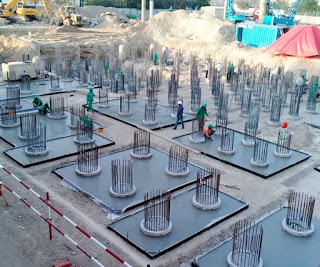All You Want To Know About Secant Piling Method
Shoring
work is useful in supporting a structure to prevent a fall down of a
building or a construction project. The most common shoring techniques
that we use during the early stage of construction that is an excavation
are as follows:
- H-or I-beam shoring
- Secant Pile Shoring
- Contiguous Pile Method
- Sheet Piles
- Diaphragm Walls
Here, today we will discuss secant shoring.
When
the building construction project is to be erected on soft ground or
sandy soil at that time secant shoring pilling method (wall) is
required. The main objective of this kind of shoring is to make sure
that the stratum behind the wall would remain intact during
construction. Secant shoring also ensures protection from the hazard due
to high sideways pressure.
To prepare a method statement for the secant piling shoring and secant
pile wall an engineer must have proficiency in that.

How secant pile shoring is done?
Secant pile shoring is done by intersecting 2 combinations of piles.
- Reinforced – It is also known as a secondary pile.
- Un-reinforced – It is also known as a primary pile.
- In secant pile shoring, primary and secondary piles are interlocked to form a continuous wall.
- First of all, a guide beam is created before the installation to keep the alignment in place. Mostly it is used during deep excavations.
- After casting the primary pile, the provisional casing is extracted.
- Then, secondary piles are instantly drilled.
- The steel cages of the reinforced pile are inserted and the structural concrete is poured to structure a continuous wall.
Features that secant pile wall must have are as follows.
- The wall must be rigid, tight, and resistant to change in soil structures.
- On top, there shall not be high deflection
- The wall must be strongly embedded in the soil well below the excavation level to offer steadiness.
- Wall must settle in perfectly to the configuration of all essential alignments


Comments
Post a Comment